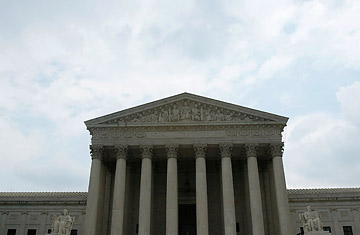
John McCain and Barack Obama are clearly divided on a number of issues — the economy, the war in Iraq, health care, abortion rights. But on the environment, it can appear that there's not much difference between the candidates. McCain has strong bona fides on climate change: he became convinced of its dangers well before many of his Senate colleagues, and is on the record for supporting a carbon cap-and-trade system. (He has wavered a bit in recent weeks.) Obama holds many of the same positions, though he does favor generally tougher measures. So, if the environment is your top concern, does it matter who gets your vote in November?
Doug Kendall says yes — but not for the reasons you might expect. Kendall is the founder of the Constitutional Accountability Center (CAC), a left-leaning legal think tank that watches Supreme Court decisions and advocates public-interest law. He points out that with the Court frequently deadlocked between more conservative voices (like Antonin Scalia and John Roberts) and more liberal ones (like Stephen Breyer and Ruth Bader Ginsburg), the next President has the power to appoint a new Justice who will tilt the Court. Perennially debated matters, like abortion rights, could be at stake, along with new hot-button issues such as the rights of prisoners held at Guantánamo. What's less well known is that there are also a number of vital environmental cases facing the Court that could go either way, depending on who wins the Presidency. "There are few areas where the battle lines are as clearly drawn between environmentalists and their opponents as the Supreme Court," says Kendall. (Listen to Kendall talk about the future of the Court on this week's Greencast.)
We've already seen the power the Court has over global warming legislation. In April of 2007, the Court shocked the Bush Administration when it ruled against the federal government in the landmark case of Massachusetts v. Environmental Protection Agency (EPA). The state was pushing the EPA to regulate greenhouse gas emissions under the Clean Air Act; the agency denied it had that right. To the surprise of many, the White House not the least, the Court ruled in favor of Massachusetts, issuing a majority opinion that the EPA did have the right to regulate greenhouse gas emissions, and that under the Clean Air Act, it needed to do so. That decision helped push the Bush Administration, kicking and screaming, toward climate change action, and provided momentum for individual states like California looking to pass their own carbon caps.
That case might make the current Court appear hospitable to environmentalists. But Massachusetts v. EPA was another of the Court's many 5-4, bitterly divided rulings, with both Justice Scalia and Chief Justice John Roberts dissenting from the majority. Those two happen to be the Justices whom McCain says he would like his possible future Court nominees to emulate. "One more conservative on the Court and [the Massachusetts] case would have likely gone the other way," says Kendall. "You have to think about what's going to happen to the composition of the Court over the next eight years."
Conservative voters who oppose what they see as heavy-handed government regulation in the environment have every reason to push for McCain, because Obama's nominations would likely halt that rightward slide. But Kendall notes that while Republicans traditionally place a high value on the fate of the Court when voting for Presidents, Democratic voters are less likely to do the same. "I don't think progressives in general understand how much is at stake in the Court," he says. "They're used to the Court coming out generally in their favor, and they don't realize how big a deal it is if the Court starts radically limiting access to ensure environmental protections."
The most complacent of environmentalists should have received a wake-up call last month, when the Justices, by a 5-3 decision, drastically reduced the punitive damages awarded to victims of the Exxon Valdez oil spill — from $5 billion to $500 million. That decision could have a chilling effect on punitive damages overall. "It's potentially a very sweeping ruling against the effort to hold corporations accountable for environmental damage and misconduct," says Kendall. "Already the court is favoring corporate interests, and it could clearly get worse."
Beyond the Court, the next President will also control the EPA, an agency that under Bush has been almost wholly defanged: that much became clearer on July 11, when the EPA released a 588-page federal notice rejecting federal regulation of greenhouse gases — essentially ignoring the Court's 2007 ruling. The agency claimed that greenhouse gas regulation would lead to too many job losses, and found it wasn't clear that global warming poses a threat to people's health. Given enough time, environmental groups would almost certainly sue to reverse the EPA's ruling, but with the Bush Administration in its last six months, that decision will be handed off to the next Administration. Which is just another reminder of how much will be at stake for the environment — for both parties — when voters go to the polls on Nov. 4.
